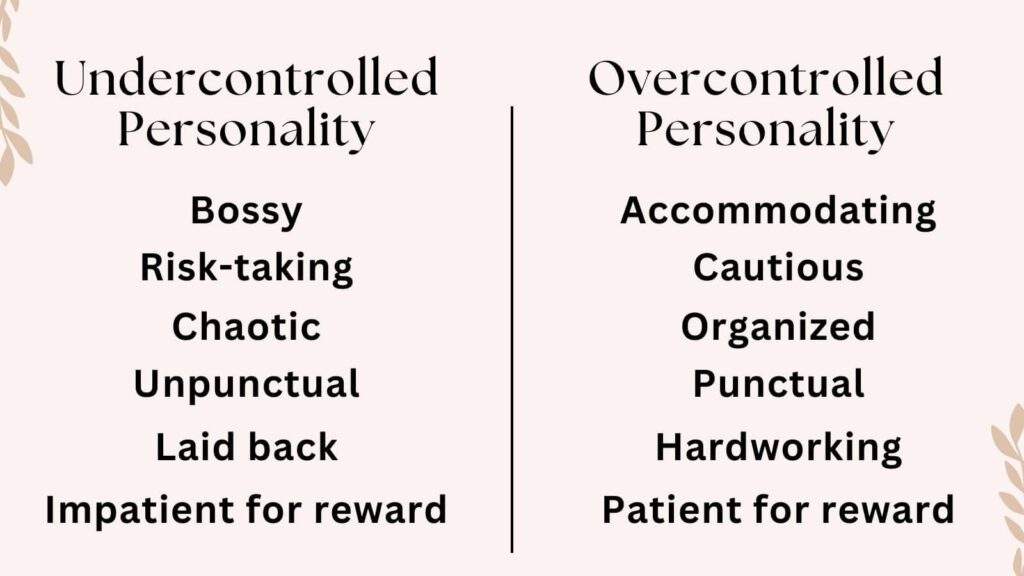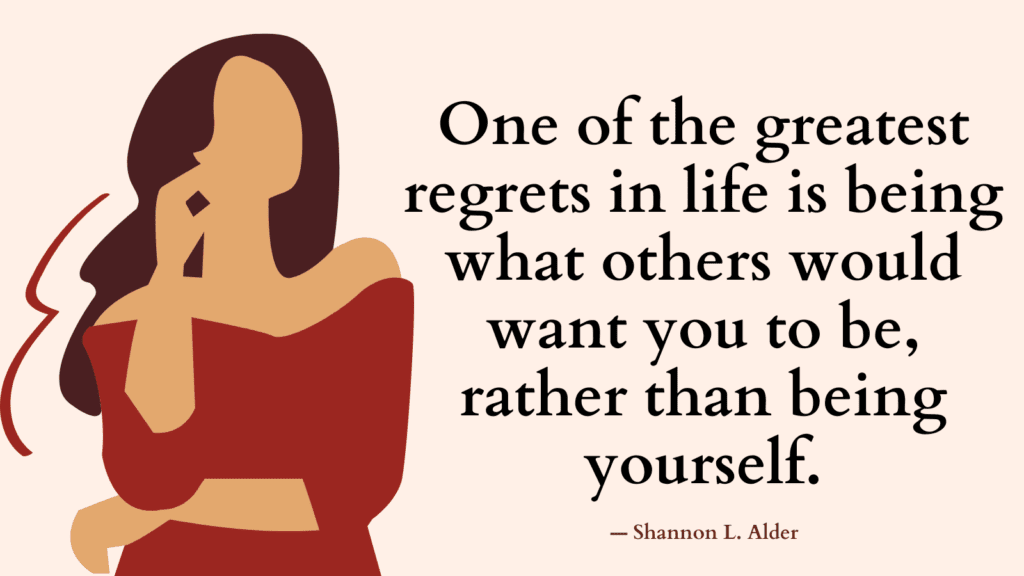Researchers have identified two personality styles that contribute to the development of different coping patterns: undercontrolled (UC) and overcontrolled (OC) personalities. (*)
Undercontrolled (UC) Personality
People who are undercontrolled had difficulty following rules and delaying gratification as children.
If treats were available, they would eat them right away.
As adults, undercontrolled people tend to be highly expressive. They are often fun to be around.
They also tend to be erratic and do things in the moment without thinking of the consequences.
Undercontrolled people also tend to have poor distress tolerance and may struggle to manage their difficult emotions.
Related: Am I Self-Destructive Quiz
Overcontrolled (OC) Personality
People with overcontrolled personality were shy as children.
As adult, they tend to have a compulsive need for structure and order and they may even be perfectionistic.
People with an overcontrolled coping style tend to have a strong ability to control their behavior and plan ahead.
They may also struggle with expressing their emotions and opinions.
Related: Top 20 Practical Ways to Overcome Toxic Perfectionism (& Get Things Done)
Undercontrolled (UC) Personality vs. Overcontrolled (OC) Personality
One of the main differences undercontrolled and overcontrolled personalities is self control.
While undercontrolled people can benefits from developing their ability to regulate and manage their behavior and emotions, people with overcontrolled personality may not benefit from those same coping strategies.
Self-control can get in the way for people with overcontrolled personality.
For instance, not being able to voice your opinion or enjoy a spontaneous night out, might interfere with your relationships and living a fulfilling life.
The following is the Paired Word Checklist (Lenz et al. 2021) that identifies overcontrolled and undercontrolled traits:
| Undercontrolled Traits | Overcontrolled Traits |
| Bossy | Accommodating |
| Risk-taking | Cautious |
| Chaotic | Organized |
| Unpunctual | Punctual |
| Laid back | Hardworking |
| Extreme | Orderly |
| Misbehaving | Disciplined |
| Fearless | Think before acting |
| Careless | Precise |
| Impatient for reward | Patient for reward |
| Slacker | Perfectionist |
| Untidy | Tidy |
| Rebellious | Obedient |
| Playful | Formal |
| Stubborn | Compliant |
| Talkative | Quiet |
| Wasteful | Frugal |
| Inattentive | Attentive |
Related: Am I A Perfectionist Quiz
How to Manage Overcontrolled Personality?
#1. Increase Self-Awareness
Our minds and bodies are always giving us clues as to what we need or if there’s something to learn.
Use the following self-enquiry questions whenever you experience unwanted emotion, tension, or urges:
- Do I feel tension when I think about this incident? Is it possible that my bodily tension means that I’m trying to avoid something?
- Am I trying to deny or ignore an emotion?
- Is there something to learn here?
Related: Lack Of Self Awareness: 5 Signs & 5 Tips On How To Increase Self-Awareness
#2. Develop Flexible Control
Flexible control is the ability to adapt to the situation you’re in.
Flexible control allows you to recognize that behavior that is helpful in a work environment might not fit when you are out with friends.
You mot be able to laugh loudly at work, but it would fit a casual gathering.
Notice when you tend to stop yourself from doing certain things and ask yourself whether it’s helpful or a more relaxed attitude would fit better.
Related: Top 7-Day Acceptance Challenge For A Peaceful Life
#3. Increase Emotional Intimacy
One of the main reasons we feel lonely even in a room full of “friends” is lack of emotional intimacy.
As someone with overcontrolled coping, you may have lots of contact with other people, but these relationships might not be emotionally close and intimate.
Practice opening up and sharing your frustrations, fear, and feelings with safe people.
If you find it difficult to do so, consider sharing your thoughts and feelings with yourself first.
Keep a journal where you spend a few minutes every day writing about anything that comes to mind. With practice, you’ll become more connected with yourself and find it much easier to your internal experience.

References
- Frontiers | Intervention on Externalizing Problems of Undercontrolled Personality Types in Primary School Students (frontiersin.org)
- Resilients, overcontrollers and undercontrollers: A systematic review of the utility of a personality typology method in understanding adult mental health problems – ScienceDirect
- (PDF) Resilient, Overcontrolled, and Undercontrolled Personality Types: Issues and Controversies (researchgate.net)
- Resilient, overcontrolled, and undercontrolled personality types: Issues and controversies. (apa.org)
- Overcontrolled, undercontrolled, and resilient personality styles among patients with eating disorders | Journal of Eating Disorders | Full Text (biomedcentral.com)



